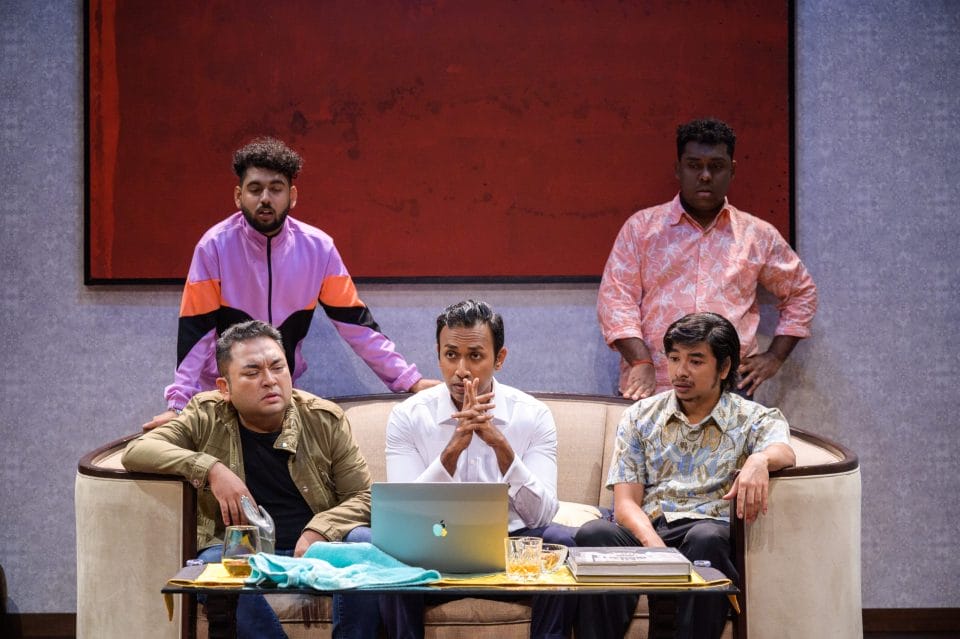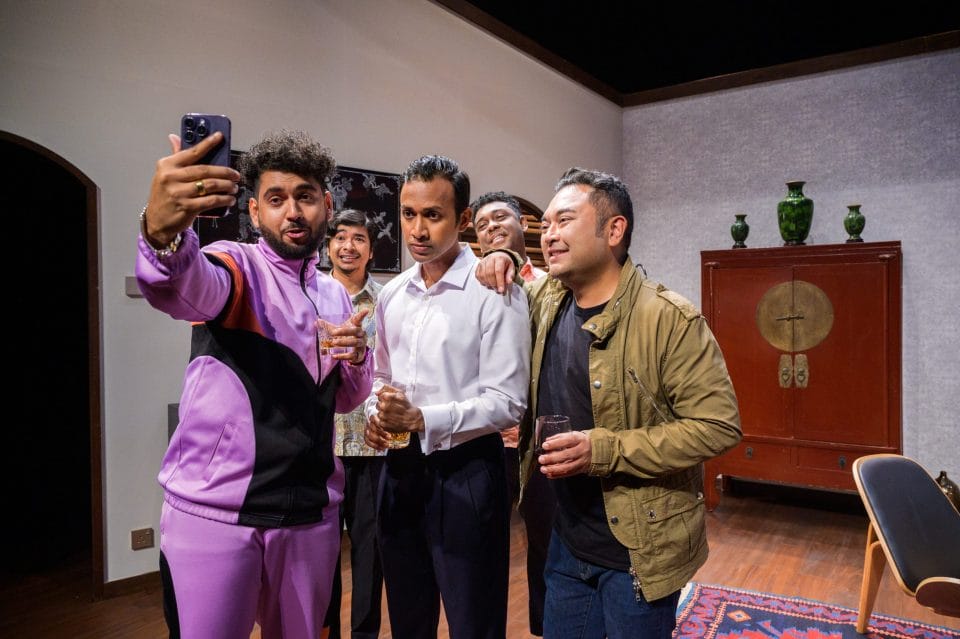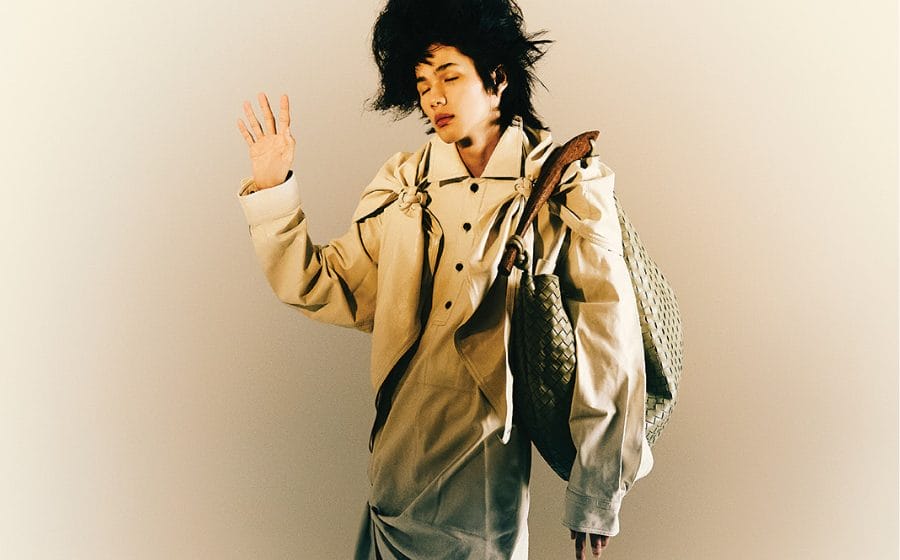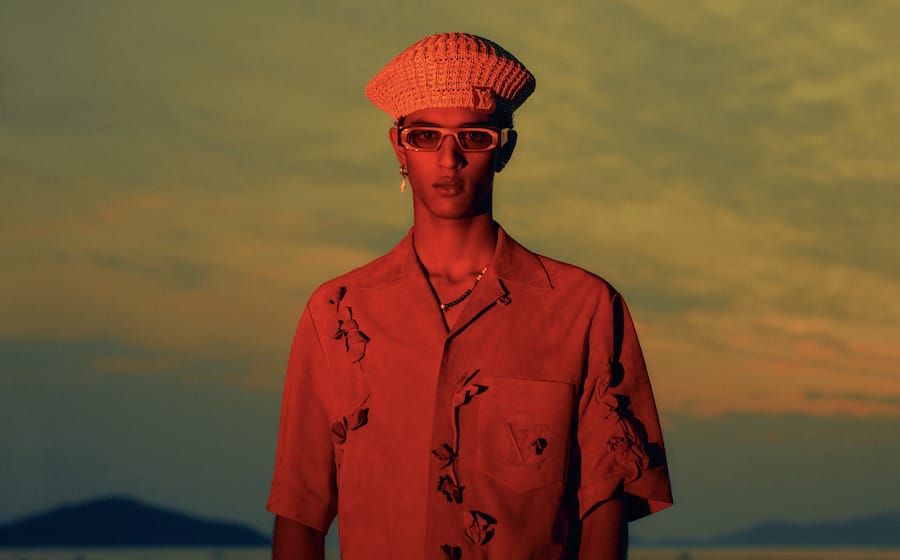 Checkpoint Theatre’s new work Brown Boys Don’t Tell Jokes by Myle Yan Tay illuminates the complexities of friendship, the dualities of jokes, and what it means to participate in human relationships with a whole heart.
Checkpoint Theatre’s new work Brown Boys Don’t Tell Jokes by Myle Yan Tay illuminates the complexities of friendship, the dualities of jokes, and what it means to participate in human relationships with a whole heart.
Human relationships are fun to study. It requires an understanding of the two parties involved, and how that spills over into a group dynamic when looked at from afar. And in some way, all relationships begin as friendships where there is a mutual likeness or acknowledgement of pleasantries in interaction before they are anything more. But being courteous and polite is far from the only thing that determines the dynamism and longevity of these connections — be it fleeting or forever — especially in the context of Singapore.
We have come considerably far in our reception to self-expression be it through fashion, music, and movement, but how accepting we are of each other still comes with the undeniable nuance of societal, cultural and political factors. Our multiracial demographic is the very fabric that both strengthens and weakens us as a community and will always continue to be a topic worth exploring as the nation grows. But where and when these conversations can happen will always be up for a discussion of its own, at least until Singapore becomes anything other than the economically-driven and meritocratic innovation nation the world is more than familiar — and somewhat in awe — with.
A bypass that we have somehow come to terms with using is the stage, and more specifically that of live theatre. Amongst all the performing arts, the form of theatre allows the imagined to take the place of the real in the most visceral way, each carefully choreographed human interaction granting words with a formidable impact in nuance and speech. The void these narratives exist in stops real time for social discourse to take place behind the safety of closed doors (or curtains), and everyone in the space reflects and searches for a solution as a collective, at the same time.
View this post on Instagram
Yet no thoughts are communicated and no real words are spoken. Not even a glance is spared unless intentioned by a director’s cue — only internal dialogues are at play. This is why theatre, or its ability to let you experience something on an individual level with peers, is so powerful. When the solutions and truths you uncover in your own self-reflection match with another audience’s members’, these solutions and truths are universalised. Theatre spotlights real-world issues with the facade of evocative literary play, and when done right, can be extremely moving and clarifying.
This is exactly what multi-talented playwright Myle Yan Tay did in his debut work Brown Boys Don’t Tell Jokes (BBDTJ) with Checkpoint Theatre, an intricate and intimate examination of friendship, race and masculinity. It felt like the small main cast, upper-middle-class living room setting and cosy black box space were the perfect medium for his words to convey and compel thought at the sort of level it did — decidedly small in look, but big in effect.
The premise is simple enough. On the eve of a general election, longtime friends Tesh (Gosteloa Spancer), Dev(Krish Natarajan), Fizzy (Adib Kosnan), Adam (Shahid Nasheer) and Scott (Ebi Shankara) — a politician, musician, activist, academic and therapist — reunite to confront a past that threatens to sabotage the hopes and dreams of Tesh’s future, putting to the test their values amidst the unforgiving socio-political climate of Singapore. More specifically, it is about crisis management; a clip of running-for-parliament politician Tesh saying racially and religiously offensive things from his university days gets leaked just before the elections, so he seeks the help of those who share a “brown solidarity” to protect or even redeem his hard-earned reputation, to stand up for him in this critical time.
View this post on Instagram
While Tesh’s crisis is born out of a string of racially and religiously charged jokes, there’s nothing to joke about from the get-go. Ethnicity and religion were often mined for laughter in the past, but today’s climate has made it a touchy topic that gets sidelined as an “optic” concern to save on the gargantuan task of stacking belief against belief.
The play opens with Fizzy apologising to Adam for posting a scandal-inducing screenshot of a conversation with him inside, which had turned out to be fake. Then, audiences learn that Dev is advised to start dating more Indian women, despite his personal preferences, for a more coherent artist “image”. Scott, who had seemed to be living a happy married life in the United States, reveals that he and his Caucasian wife are on a break, unable to reconcile their cultural differences. Then, we finally have Tesh — the Chindian politician who likes to speak Chinese at rallies while championing for minority representation — bringing together the whole group in an attempt to save his skin. It’s clearly a delicate and exclusive discussion to be had that anyone who has grown up here is familiar with, but put in front of an audience, is suddenly more intellectually stimulating and emotional.
View this post on Instagram
By going full circle and letting audiences in on these qualms, audiences are forced to wonder if they have had to consciously negotiate this kind of position and privilege in their own lives. Despite the group’s history and friendship, no one is willing to be part of the public appeal video Tesh requested they appear in for him, even if they claim to be the only people that can truly understand each other’s struggles, because of “optics”. Double standards are no doubt still thriving in the undercurrents of our every day, so it is precisely in this discussion on “optics” that Tay flips the coin on its head to say the opposite — these five men are more than their “brownness”.
The delight of watching this play comes from the insistent irony and clever wordplay that makes every joke feel refreshingly sour. Jokes are meant to be warm and light; it is comic relief, a tension diffuser. The audience also knows when the jokes are supposed to land literally and when they are meant to be sarcastic. Somehow even the way the characters look and act are also comical, especially Dev’s caricature of a loud tracksuit, and the many “costumes”— formal suits, just shirt-and-tie, a kurta — Tesh considers for his video to the people. Yet because the brown boys often conflate the role of the joke-teller with the butt of the joke, the instinct to laugh is either suppressed with half-heartedness or surrendered to, then called to a halt. It now becomes the source of tension, and this duality is why Tay’s subtle screening of the characters’ complexities is exactly telling of the main aim of the play — to accept and embrace complexity, in an age where simplification, especially in the form of humour, is an expectation we now take granted for in daily life.
 Where “brownness” can serve the purpose to build community, it can also mask the nuances of living that way to outsiders. By allowing audiences to visualise the problems that the characters face in BBDTJ in the context of a friend gathering, those who are not brown or boys experience firsthand what jokes really mean to these five and their peers — a self-deprecating defence mechanism that only serves to bite them back in the future. In their problem-solving, the characters make it clear that ethnicity is the root cause of their worries, but in their back-and-forth, they also show how friendships that hold water, consider so many more values. It’s hard to evaluate the worth of their bonds without also considering the masculinity, class, and public and private personas that intersect. And for that matter, how different shades of brown also colour the experience of these elements differently. Despite their flaws, there is an undeniable warmth in Dev’s ending call with his mother in Tamil, and Tesh’s hospitality towards Scott. Even Adam’s pessimism towards politics and the situation at hand has an endearing voice of reason — each character has redeeming traits that make the audiences feel for them, lukewarm or to the point of fondness. And that is how we engage in relationships if we truly were committed to knowing and valuing someone wholly — a reason why the play as an extrapolation of Tay’s own friendships and experiences, however, dramatised by the talented cast, still feels somewhat sincere and complete.
Where “brownness” can serve the purpose to build community, it can also mask the nuances of living that way to outsiders. By allowing audiences to visualise the problems that the characters face in BBDTJ in the context of a friend gathering, those who are not brown or boys experience firsthand what jokes really mean to these five and their peers — a self-deprecating defence mechanism that only serves to bite them back in the future. In their problem-solving, the characters make it clear that ethnicity is the root cause of their worries, but in their back-and-forth, they also show how friendships that hold water, consider so many more values. It’s hard to evaluate the worth of their bonds without also considering the masculinity, class, and public and private personas that intersect. And for that matter, how different shades of brown also colour the experience of these elements differently. Despite their flaws, there is an undeniable warmth in Dev’s ending call with his mother in Tamil, and Tesh’s hospitality towards Scott. Even Adam’s pessimism towards politics and the situation at hand has an endearing voice of reason — each character has redeeming traits that make the audiences feel for them, lukewarm or to the point of fondness. And that is how we engage in relationships if we truly were committed to knowing and valuing someone wholly — a reason why the play as an extrapolation of Tay’s own friendships and experiences, however, dramatised by the talented cast, still feels somewhat sincere and complete.
So when Fizzy and Scott reveal their secret relationship to the rest, it is not a convenient device put in for the sake of gender diversity. And neither, is there a token attempt to participate in a mental wellness conversation with Scott’s drinking habit and his being privy to Tesh’s worsening mental health. The power of academia too, so often discussed regarding its power to affect change in the world, is portrayed by Adam’s academic neutrality that is derived from a journey of acceptance. After participating in the same political conversations Tesh and Fizzy are currently caught up in, his character arc concerns him coming to terms with his inability to affect change. These issues are seeded throughout BBDTJ to prove that friendships, under the guise of any group identifier, are innately and universally complex, and can both encourage or stagnate personal growth. And that’s neither bad nor good. It’s taking ownership of differences, a poignant plea to be kinder. It’s making sure the multiracial image that Singapore prides itself on can be something its people are also proud of without an audience.
View this post on Instagram
It’s about being self-reflexive. Tay’s script is brilliant, because as much as you feel and see the unity in the five men’s minority experiences, you also encounter your distance, whether near or far, from that conversation. As a Chinese woman, being privy to this was a feeling of surprise that should not have been. It is in the intimacy of the setting and tone that nuances of ethnicity become jarringly stark, the caption-less lines in Mandarin, Malay and Tamil a confrontational truth that reclaims the duality of embracing differences. The script also never degenerates into righteous attempts to sanitise the talks of cancel culture, dirty political games and racism. It sets it free, as it should in a safe space, to be dealt with like any other argument.
So do brown boys tell jokes? What does it take to maintain a friendship over time? How does one still stand by a friend when said friend is at odds with society, economy, politics and culture? With the promising voice of Tay coming into the conversation, expect the complexes of being human to remain rightfully complex, through it all.
Once you’re done with this story on Checkpoint Theatre’s Brown Boys Don’t Tell Jokes, click here to catch up with the rest of our April 2023 issue.








